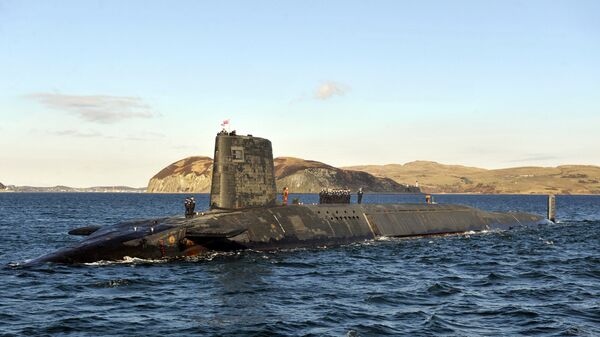More than 500 safety events of "near-misses" and "human error" have been recorded at the storage place of the UK's 'Trident' nuclear deterrent since 2006, according to the Ministry of Defence (MoD).
According to the Daily Mail Online, the Minister of Defence Procurement, Stuart Andrew, wrote in a letter to the British parliament that overall, 505 "events" over the past 12 years were recorded at HM Naval Base Clyde at Faslane, Scotland, were the overwhelming majority of the UK's nuclear submarines are based.
"Safety Incidents" — calling them that would be funny if it wasn't so serious! #nuclear #Trident https://t.co/fYylK2BrkM
— David Pybus (@Peacelinks) November 19, 2018
The findings come on the heels of a public row last year when Downing Street was accused of trying to cover up a missile malfunction when the weapon was tested and failed mid-flight off the coast of Florida in June 2016.
READ MORE: Files Expose UK Plan to Nuke Middle East Oil Fields in Event of Soviet Invasion
In the letter, Mr Andrew's rather alarmingly explains how the events that occurred consisted of "near-misses, equipment failures, human error or procedural failings."
In what could be described as a peacenik's worst nightmare, two of the accidents that happened were recorded as ‘Category A', which means that they were of the upmost level of danger. These allegedly occurred in the years 2006 and 2007. Category A events have "actual or high potential for radioactive release to the environment," according to reports on the letter.
Explain therefore why countries such as Germany, Sweden and Canada manage very well without #trident? And can therefore spend much more on their own countries instead of propping up the USA? #socialistSunday
— CoolD- #GTTO #blairitesout (@Coo1_Daddy) November 11, 2018
Despite the alarm, Mr Andrew reportedly wrote that in "neither event was any radiological contamination evident." To temper concerns about public and staff safety, he also added that, "none of the events caused harm to the health of any member of staff on the naval base, or to any member of the public."
Deidre Brock, an MP for the Scottish National Party who originally requested the information from the MoD is widely quoted as saying that, "discovering that there is a succession of safety failures, more than one a week in recent years, really brings home how dangerous Faslane is."
It's ok, it's only the Jocks at risk, entirely amusing since they don't even want Trident! Who cares as long as we can strip their assets and they continue to believe they can't do without us? Lol. https://t.co/wA8OaiPArS
— Kenneth (@altarathedark) November 19, 2018
The UK's MoD came under heavy fire back in late 2017 when it made the decision to classify annual reports from the Defence Nuclear Safety Regulator (DNSR) as 'secret.' The DNSR is an internal MoD watchdog, which has warned for years about safety risks and a shortage of experiences nuclear engineers to work on the Trident submarines. In 2007, the DNSR warned of "crew fatigue" and warned of "11 potentially significant risks" at Faslane. In 2014, the group said that a lack of skilled personnel constituted "the principal threat to the delivery of nuclear safety."
READ MORE: Lockheed Martin Wins $44Mln for Trident Submarine Ballistic Production
Kate Hudson, the general Secretary of the Campaign for Nuclear Disarmament has been quoted across the British media as saying of these latest revelations that she "welcomes a return to a degree of transparency" marked by the public release of the figures. However, she cautions that the numbers "confirm our fears, revealing a catalogue of accidents in the last three years.""Many of these incidents involved the Trident submarines which carry Britain's nuclear weapons," she reportedly added
“While we welcome a return to a degree of transparency, the figures in the defence minister’s letter confirms our fears, revealing a catalogue of Trident accidents in the last three years."
— CND (@CNDuk) November 18, 2018
— CND's Kate Hudsonhttps://t.co/NCbgb61z77


